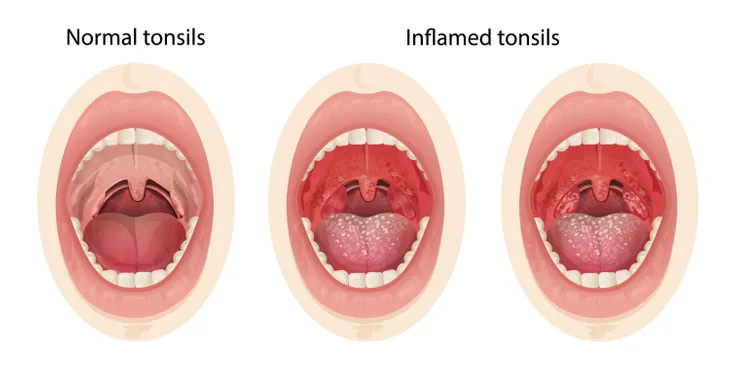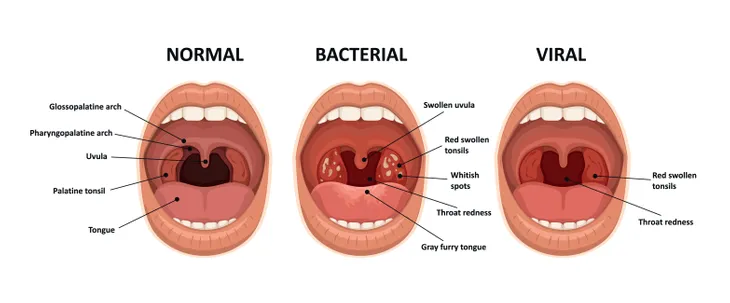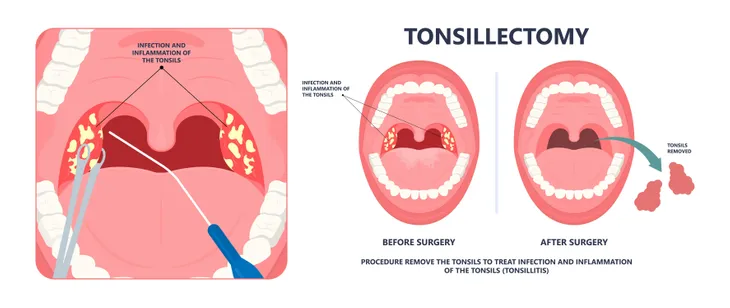Do you have a very sore throat? Perhaps you also have difficulty swallowing. If this is the case, you might be suffering from tonsillitis, an infection that causes the tonsils to become inflamed. Symptoms can be painful but luckily there are effective treatment options that can help you get on the road to recovery.
In an effort to better understand this infection, here’s everything you need to know about tonsillitis. We’ll break down the different types, the common symptoms, and when you should get to the doctor. We’ll also explain some treatment options and ways you can prevent it from happening again or to other members of your family. Let’s dive in!
What Is Tonsillitis?
Your tonsils have an important job of acting as filters for bacteria and viruses that enter your mouth. This is possibly what also makes them vulnerable to infection and inflammation. Your tonsils also make antibodies to fight infections, says WebMD. When your tonsils become overwhelmed with bacteria or viruses, they can become infected or inflamed, causing tonsillitis.
Tonsillitis is most common in children, however, teenagers and adults can still get it too. An individual can experience tonsillitis once but in some cases, it can be chronic or recurring. Let’s take a closer look at what this means next.
Acute vs. Chronic Tonsillitis: What’s the Difference?
If you get tonsillitis once and your symptoms last for 10 days (or less), then this is considered acute tonsillitis. Healthline also notes, “Acute tonsillitis will likely improve with home treatments, but in some cases may require other treatments, like antibiotics.”
In contrast, if your symptoms last longer you may have chronic tonsillitis. The source also notes that chronic tonsillitis may also lead to tonsil stones, which are white or yellowish masses that can develop on the surface of the tonsil.
What You Need to Know About Recurrent Tonsillitis
An individual can also experience recurrent tonsillitis. It’s considered recurrent when you experience tonsillitis at least five to seven times in one year.
Healthline continues to explain recurrent tonsillitis can also be defined as, “occurrences at least 5 times in each of the previous 2 years,” or “occurrences at least 3 times in each of the previous 3 years.” Recurrent tonsillitis may be caused by genetics. The source also notes biofilms in the folds on the tonsils can also be the culprit for recurrent cases.
Common Signs and Symptoms of Tonsillitis
The telltale signs of tonsillitis are a very sore throat, and pain (or difficulty) while swallowing. The individual may also experience a scratchy-sounding voice, jaw, and neck tenderness if the lymph nodes are swollen and the tonsils will often appear swollen and red.
Other common symptoms of tonsillitis are fever, chills, and earaches. Stomachaches and headaches can be common too. Children who are very young may have difficulty verbalizing their symptoms, so be on the lookout for increased irritability, poor appetite, and excessive drooling as these could indicate tonsillitis.
Is It Contagious?
Tonsillitis is not contagious in itself, however, the infections that caused it to occur are, such as a cold or flu are contagious. If you develop tonsillitis, it’s best that you stay home from work or school and avoid other people while you recover.
Healthline says you can be contagious 24 to 48-hours before you develop symptoms, and you can still be contagious after you’re no longer sick. However, the source notes if you take antibiotics for bacterial tonsillitis you should stop being contagious after 24-hours.
When to See a Doctor
Symptoms of tonsillitis typically go away within 7 to 10-days. However, if you develop a high fever of 103-degrees Fahrenheit (39.5-degrees Celsius) or more you should see a doctor. Muscle weakness, neck stiffness, and a sore throat that doesn’t go away after a couple of days also warrants a doctor’s visit.
You should also seek immediate medical care if your child has difficulty breathing, extreme difficulty swallowing, or excessive drooling.
Complications
Tonsillitis isn’t often serious but in some cases, it can lead to complications especially if you’re suffering from chronic tonsillitis. For starters, chronic tonsillitis may lead to obstructive sleep apnea, says the Mayo Clinic.
Other complications include peritonsillar abscess which is an infection that causes a collection of pus behind the tonsils. Tonsillar cellulitis which is an infection that spreads deep into the surrounding tissue is also possible.
How Is Tonsillitis Diagnosed?
To diagnose tonsillitis, your doctor will first ask about your symptoms. Then they’ll examine your throat and look for swollen, red tonsils, and white spots on the tonsils.
Your doctor may also look for other signs of infection in your nose and ears and they will likely feel the signs of your neck to see if your lymph nodes are swollen. Once your doctor confirms a tonsillitis diagnosis, they’ll then have to determine whether it was caused by a virus or bacteria. This will help them determine the best course of treatment.
Viral vs. Bacterial Tonsillitis: What’s the Difference?
Viruses are the most common cause of tonsillitis, says Healthline. Common viruses such as the common cold often cause it. That said, other viruses can also cause it such as rhinovirus, Epstein-Barr virus, hepatitis A, and HIV.
Bacterial tonsillitis, on the other hand, is most often caused by strep bacteria which causes strep throat. The source says, “around 15 to 30 percent of tonsillitis cases result from bacteria.”
At-Home Treatment
If you or your child have viral tonsillitis at-home care is the only treatment. You’ll have to let it run its course but there are a variety of effective remedies you can do to help ease your symptoms while you recover. For starters, be sure to get plenty of rest and provide plenty of fluids to prevent dehydration and to keep the throat moist.
Further, a humidifier can help eliminate dry air that can irritate a sore throat. If your child is the appropriate age, prepare a saltwater gargle of 1/2-teaspoon of table salt to 8-ounces of warm water. Gargle the solution and spit it out. Finally, during recovery enjoy warm liquids like broth, caffeine-free tea, or warm water with honey. Ice pops can also be effective in soothing a sore throat.
Treatment: Antibiotics
If your case of tonsillitis is caused by a bacterial infection then your doctor will likely prescribe antibiotics. A full course of antibiotics is typically taken orally for 10-days.
The Mayo Clinic says, “failure to take all of the medication as directed may result in the infection worsening or spreading to other parts of the body.” With this in mind, be sure to follow your doctor’s instructions.
Treatment: Surgery
In some cases, surgery may be necessary. Surgery to remove the tonsils is called a tonsillectomy. This option is most often used to treat recurring tonsillitis and chronic tonsillitis. It may also be used if antibiotics fail to treat bacterial tonsillitis.
The good news is a tonsillectomy is often an outpatient procedure, unless your child has a medical condition, is very young, or if complications arise during the procedure. A complete recovery is typically expected 7 to 14-days after surgery.
Causes of Tonsillitis
The most common cause of tonsillitis is from common viruses, such as the common cold. That said, bacterial infections can also be the culprit too.
Streptococcus pyogenes (group A streptococcus), also known as the bacterium that causes strep throat, is the most common bacterium that causes tonsillitis. However, other strains of strep, as well as other bacteria, can also be the cause.
Risk Factors
Certain factors can increase your risk of getting tonsillitis. For starters, the Mayo Clinic says young age can be a risk factor as tonsillitis most often affects children ages 5 to 15-years.
Another risk factor is frequent exposure to germs. The source says, ” School-age children are in close contact with their peers and frequently exposed to viruses or bacteria that can cause tonsillitis.”
How to Prevent Tonsillitis
Since tonsillitis is caused by germs, the best way to prevent it is to practice good hygiene. It’s important that you teach your child how to wash their hands effectively and frequently, especially before eating and after using the bathroom. You should also ensure your child knows not to share food or drinks with others.
If you or your child develop tonsillitis be sure to replace your toothbrush. Staying home during recovery is also essential to prevent spreading the infection to others. Talk to your doctor to find out when it’s ok to return to school/work.


















